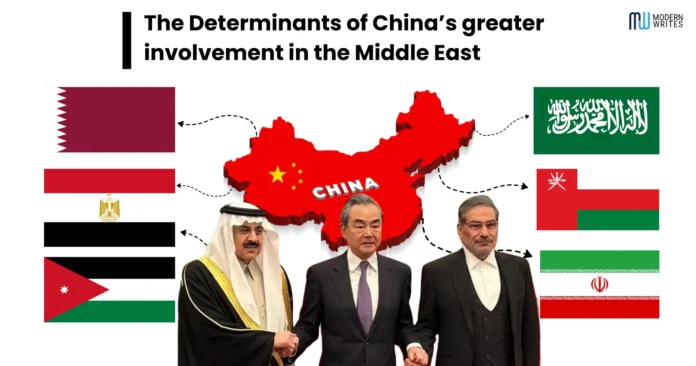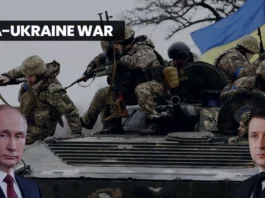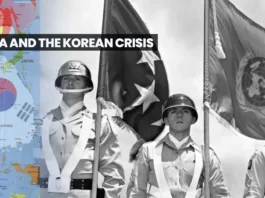Introduction
China has extended its outbound investments in the Middle East in the twenty-first century, especially within the fields of power, the improvement of natural assets, and infrastructure initiatives that have the potential for dual-use for both civilian and army functions. The Belt and Road Initiative is China’s grand plan to help broaden its financial system and extend its influence through investment, dealing with, and building infrastructure in developing countries and strategic areas. China’s increased involvement in the Middle East depends on certain factors. The Determinants of China’s greater involvement in the Middle East
The execution of this could involve the investment, control, and production of belt and road infrastructure. It has made commitments to help centre eastern nations in the production of progressed infrastructure and has endorsed his or her participation in the formation of the Asian Infrastructure Investment Financial Institution. As of now, ten nations have joined, which include Egypt, Israel, Iran, Jordan, Kuwait, Oman, Qatar, Saudi Arabia, and Turkey. Other governments have also considered working with China to foster peace because of the promise of infrastructure and improvement.
China’s foreign policy
Since its inception, China’s overseas and protection coverage in the Middle East has placed a significant emphasis on adhering to the non-interference precept. The principle of non-interference in the internal affairs of other sovereign states serves as the cornerstone of the Human Republic of China’s foreign policy, guiding its approach towards the surrounding region and the rest of the world. Beijing has formulated rules of non-intervention, territorial integrity, and sovereignty, but they are conditional and evaluated on a character basis (Alterman, 2017). Beijing consistently conducts its overseas and protection coverage with vast discretion, despite the reality that non-interference is a fundamental guiding precept in China’s diplomatic acts and a crucial rhetorical weapon. This has been the case since the start.
China stays out of the domestic affairs of other nations unless it threatens or impairs China’s own national or economic interests, such as the safety of its growing overseas assets, its people, or its energy supply. China has been exerting significant efforts to elevate its standing in the global community, aiming to establish itself as a formidable energy force and a significant participant in the regional arena. As a direct result of this, China’s influence and prestige within the region, as well as the rest of the world, will boom (Potter 2013; Wang 2011).
The United International locations of Truce Supervision Corporation inside the Centre East welcomed the first Chinese language monitors in 1990, no matter China’s preceding reluctance to take part. The Chinese authorities’ perspective on these types of sports underwent a change in the 1980s. Since then, China has sent military advisors to Syria and troops to Lebanon to help maintain peace.
China Involvement in Middle East and MENA Countries
Beijing has deliberately elevated resolving disputes and crises in the Middle East to the top priority in China’s foreign policy. In order to play a more constructive role in the resolution of conflicts (such as the Iranian nuclear dilemma and the Syrian Civil War), Beijing has expressed hope that it will strengthen its collaboration. In order to provide support to operations against piracy in the Arabian Seas, China has a warship stationed in the Gulf of Aden.
Chinese soldiers stationed in the Middle East primarily participate in anti-piracy patrols off the coast of Somalia. The United Nations mandates these patrols as part of their mission. In addition to this, the People’s Liberation Army Navy received assistance from Beijing in 2016, when the Chinese capital established its first naval presence outside of China in the country of Djibouti (PLAN). The Chinese government states that the Djibouti station will primarily function as a resting place for the over 2,400 Chinese soldiers currently stationed in the region for anti-piracy, UN peacekeeping, and humanitarian rescue missions.
These soldiers will be involved in missions to rescue people in need. The Djibouti station will offer China expertise in the creation of new foreign military stations, enabling it to extend its sphere of influence in the region. As Chinese interests expand in the volatile area, it will be more difficult for Beijing to continue to uphold its position of neutrality. Should the United States appear to be retreating from the Middle East more rapidly, China will likely feel compelled to step in to safeguard its own interests in the region. China may feel obligated to increase its political and security presence in the area, despite its preference not to do so.
The Engagement of economic interests in politics and security is crucial
As of this point, China has established diplomatic connections with 15 different Middle Eastern nations. China is conducting anti-piracy and maritime security operations in the Gulf of Aden and the Arabian Sea, and has carried out large-scale rescue operations in Libya (2011) and Yemen (2015). It has intensified its mediation efforts in crises such as Syria and Yemen, and it played a major role in getting Tehran to accept the Iran nuclear pact. It has appointed two special envoys to conflict-torn governments in the Middle East, and it has boosted its mediation efforts.
The construction of China’s first overseas military post in Djibouti and the anticipated fortification of the Pakistani port of Gwadar have both contributed to an expansion of China’s military presence in the region around the strategically important Strait of Hormuz and Bab el-Mandeb. Last but not least, China has sent supplies of small guns to a number of Middle Eastern nations. It would seem that China is gaining significant knowledge of the Middle East. Even though this region is not at the top of China’s priority list for its foreign policy objectives, there is a growing debate inside China over the need for more involvement to safeguard Chinese economic interests.
Chinese strategists are increasingly asserting that enhancing their country’s military presence in the region is necessary to overcome their nation’s reputation as a free rider in the region. As shown by the fact that its official leaders avoid dealing directly with the area’s most pressing concerns, China has not made a significant contribution to the reduction of geopolitical tensions in the region. China has joined Russia in backing the Syrian government in the United Nations Security Council. China had previously supported Russia’s stance on Syria.
Consequences for European interests
Over time, the European Union (EU) anticipates that China’s presence in the Middle East will impact its financial and protection interests in some exclusive domain names, potentially leading to repercussions for Europeans. China is hastily gaining foothold as a challenger to Western influence in the Middle East by pushing a model of non-democratic growth and monetary participation within the area. As a result, China has gained momentum as a challenger to Western influence in the Middle East. Europeans must acknowledge this shift, monitor China’s economic and security influence in the region, and work out new ways of engaging China on issues pertaining to the Middle East.
This is especially important in light of the significant unrest in the region. By adopting this step, they will be able to convince Beijing to accept a solid international system that safeguards European interests. This will be possible because of the previous step. Despite China’s continued caution over its political and security engagement in the region, we anticipate that China’s economic presence will significantly impact Europeans. China’s direct investments and assistance for development play a significant role in regional growth. Perhaps the impact on the economy of the immediate area is even more significant than the combined influence of the United States and Europe.
China’s investments in rebuilding essential infrastructure in Middle Eastern countries, particularly in regions severely affected by violence, could potentially have far-reaching consequences for those nations. When determining the viability of development projects and the conditions surrounding them, China uses a different set of criteria than the West does in terms of good governance, economic infrastructure, the rule of law, and respect for human rights. China’s approach is based on the idea that the West places too much emphasis on these factors.
Development before Democracy,
Since Xi Jinping’s election as president of China in 2013, Beijing’s authorities have been striving to transform China into an international powerhouse and secure greater aid from the United States. Beijing shaped the Silk Street Fund, the Asian Infrastructure Funding Bank, the Shanghai Cooperation Organization (SCO), the Brics, and the Belt and Road Initiative (BRI) as a way to assist in this endeavour. Similarly, it became a lively player in a ramification of international boards, including the Twenty and the Asian convention on interplay and self-belief-building measures.
These potentially hazardous endeavours have the dual goals of gaining the support of the Chinese people and launching a new phase of globalization throughout the continents of Europe, Asia, and Africa. In addition to this, they want to fortify commercial ties and enhance China’s position in the international community. According to the assertions of Professor Li Shaoxian of Ningxia University, for a considerable amount of time following the conclusion of the Cold War, China saw the MENA area as “a chaotic and horrible graveyard where empires are buried.” As a result of political unrest, the Middle East and North Africa (also known as MENA) were fragmented regions that had far less significance than Asia as a whole.
However, beginning in 2013, China began seeing the MENA region as an essential method of enhancing its presence on the world stage. As a result, Beijing’s strategy for the Middle East and North Africa region is shifting from a focus on achieving financial gains while avoiding political involvement to a more cautious approach that aims to meet the demands of all events. China’s political and monetary impact in the Middle East and North Africa (MENA) region will grow over the next several years. The fundamental purpose of this project is to improve cooperation between financial institutions.
Mediation diplomacy The Determinants of China’s greater involvement in the Middle East
Prolonged wars in MENA have provided Beijing with a significant opportunity to enhance its status as a world power through conflict resolution. China has now nominated special envoys for African affairs, the Middle East peace process, the Afghan conflict, and the Syrian war. Chinese special envoys are generally more pragmatic and patient than their European and US counterparts, seeking incremental solutions to thorny problems, albeit through responses that can be passive and inefficient at times.
China’s involvement in mediation in MENA often takes the form of a cautious approach to conflict resolution in which it becomes engaged with the process but does not play a decisive role. Beijing chooses to participate rather than dominate; to follow rather than lead; to put forward constructive ideas rather than set agendas; and to pursue de-escalation rather than all-out resolution in complicated wars.
Due to its still-limited influence, China only acts as a mediator in four broad ways. The first of these is multifaceted interventions in places such as Sudan and South Sudan, where China’s huge investments have had significant political influence. The second is proactive engagement in disputes such as the Iranian nuclear program and the Israeli-Palestinian conflict.
The third is limited intercession, such as in the Libyan civil war, the Syrian conflict, the Yemeni war, the Saudi-Iranian dispute, and the Gulf States’ blockade of Qatar, all situations in which China has limited influence. The fourth way is indirect participation, such as through the UN on the Somali crisis; the Western Sahara issue; Iran’s maritime disputes with the United Kingdom and the US; the sectarian conflicts among Sunni, Shi’ites, and Maronites in Lebanon; and military campaigns against the Islamic State group, al-Qaeda, and their affiliates. Because it lacks substantial interest in or influence on the parties, China’s involvement in these cases is minimal.
Conclusion
One of Beijing’s most pressing and obvious objectives is to rapidly expand China’s commercial ventures, economic assets, and energy supply from outside sources. China’s foreign policy employs its diplomatic apparatus and engages in economic diplomacy to defend and advance its diplomatic, political, and economic goals when they come under threat. China conducted civilian evacuations in Yemen (2015), Syria (2011), Egypt (2011), and Lebanon (2015) throughout the course of the previous decade (2010). Because of Beijing’s ever-increasing economic interests and overseas investment, the Middle East has become the initiative’s focal point and fulcrum. Still, the Middle Eastern crises are major regional issues with worldwide consequences.
China has begun to play a role in resolving these challenges, although cautiously, in order to safeguard its increasing international interests, its own people, and its energy supply while gradually extending its political clout in the region. Without abandoning its long-standing non-intervention policy or getting too involved in substantive engagement and mediation, Beijing’s involvement in the crises in the Middle East retains a degree of impartiality and fairness. But China’s top officials have been candid about the fact that they can’t afford to invest much in solving the Middle East’s thorny challenges.




